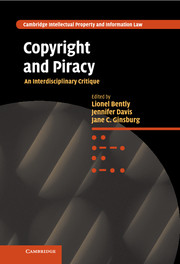Book contents
- Frontmatter
- Contents
- Notes on the contributors
- Editors' preface
- Table of cases
- Table of statutes
- Part I Introduction
- Part II History
- Part III Comparative Law
- Part IV Economics
- Part V Linguistics
- Part VI Computer software
- Part VII Information studies
- Part VIII Literature
- 14 Unoriginal genius: plagiarism and the construction of ‘Romantic’ authorship
- 15 The genius and the labourer: authorship in eighteenth and nineteenth-century copyright law
- Part IX Art
- Part X Sociology/music
- Part XI Criminology
- Bibliography
- Index
14 - Unoriginal genius: plagiarism and the construction of ‘Romantic’ authorship
from Part VIII - Literature
Published online by Cambridge University Press: 17 November 2010
- Frontmatter
- Contents
- Notes on the contributors
- Editors' preface
- Table of cases
- Table of statutes
- Part I Introduction
- Part II History
- Part III Comparative Law
- Part IV Economics
- Part V Linguistics
- Part VI Computer software
- Part VII Information studies
- Part VIII Literature
- 14 Unoriginal genius: plagiarism and the construction of ‘Romantic’ authorship
- 15 The genius and the labourer: authorship in eighteenth and nineteenth-century copyright law
- Part IX Art
- Part X Sociology/music
- Part XI Criminology
- Bibliography
- Index
Summary
‘Viva La Vida’, released on 7 May 2008, was the band Coldplay's first single to top both the UK Singles Chart and the US Billboard Hot 100, and it was subsequently nominated for a Grammy award; it was also allegedly stolen from an obscure Brooklyn-based group called Creaky Boards. Their version, entitled with presumably unwitting irony ‘The Songs I Didn't Write’, had been written a year before. Creaky Boards argued their case on YouTube and achieved overnight fame, before retracting the allegation and claiming that both songs shared a common source in a video game, ‘The Legend of Zelda’.
Then, on 4 December 2008 guitarist Joe Satriani stepped up to the plate and accused Coldplay of plagiarizing ‘Viva La Vida’ from one of his songs, ‘If I Could Fly’ (2004). Fifty seconds into ‘If I Could Fly’ Satriani plays a melody line which does seem to be remarkably similar to/have inspired/been plagiarized for the refrain of the Coldplay hit. He sought ‘any and all profits’ from ‘Viva La Vida’. And at the same time, Yusuf Islam (formerly Cat Stevens) also identified similarities with his ‘Foreigner Suite’ (1973). Yusuf's allegation was dropped (‘I don't think they did it on purpose’, he told the Sun, ‘I'd love to sit down and have a cup of tea with them and let them know it's ok’), but Satriani's case went to court in Los Angeles.
- Type
- Chapter
- Information
- Copyright and PiracyAn Interdisciplinary Critique, pp. 271 - 299Publisher: Cambridge University PressPrint publication year: 2010
- 1
- Cited by



